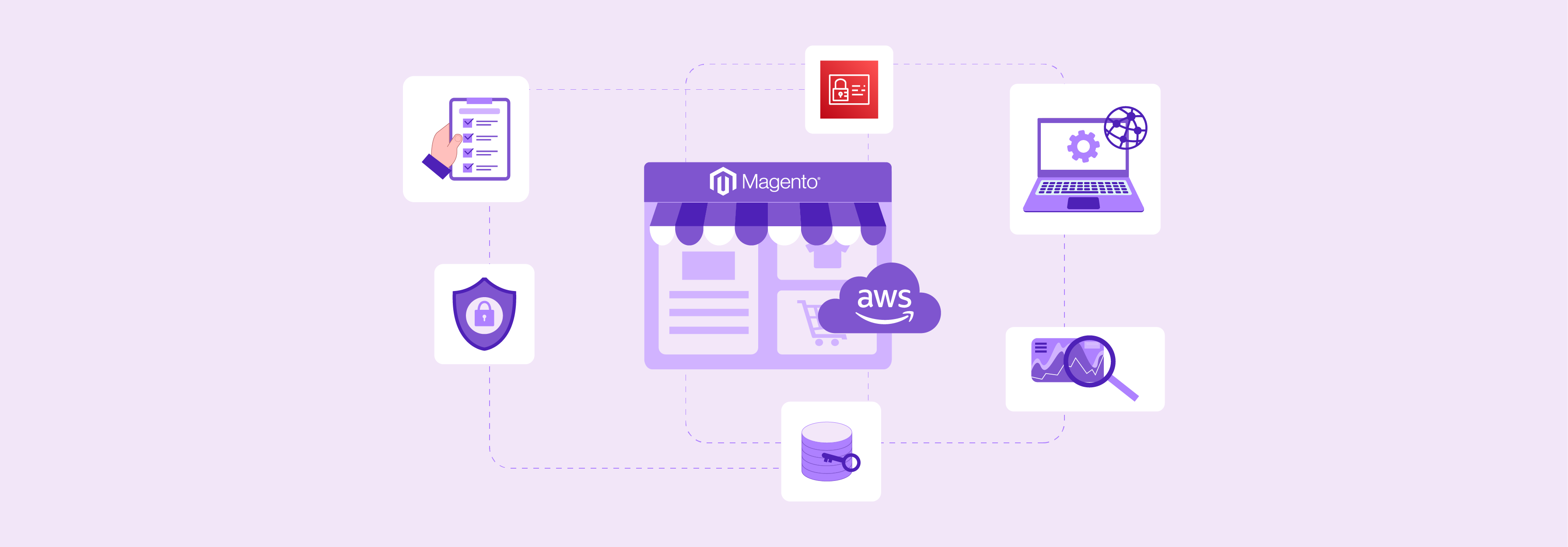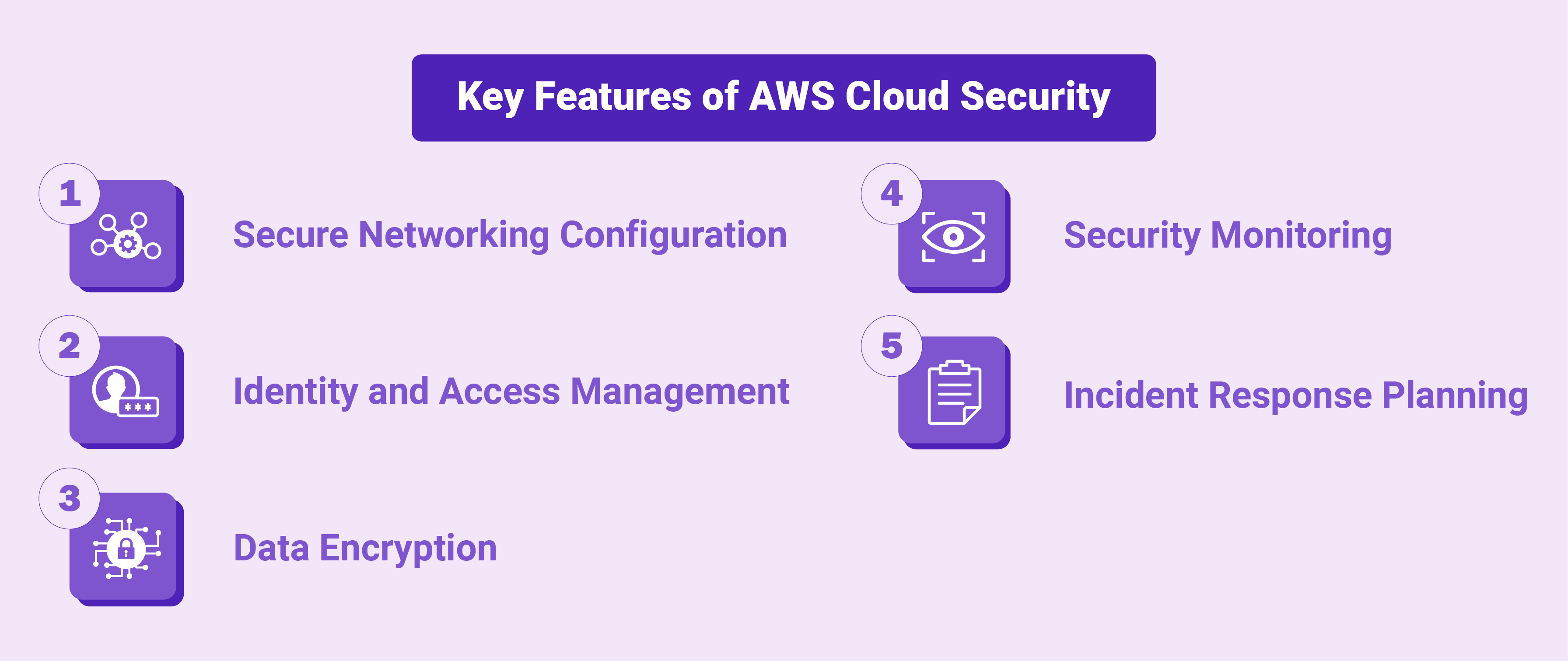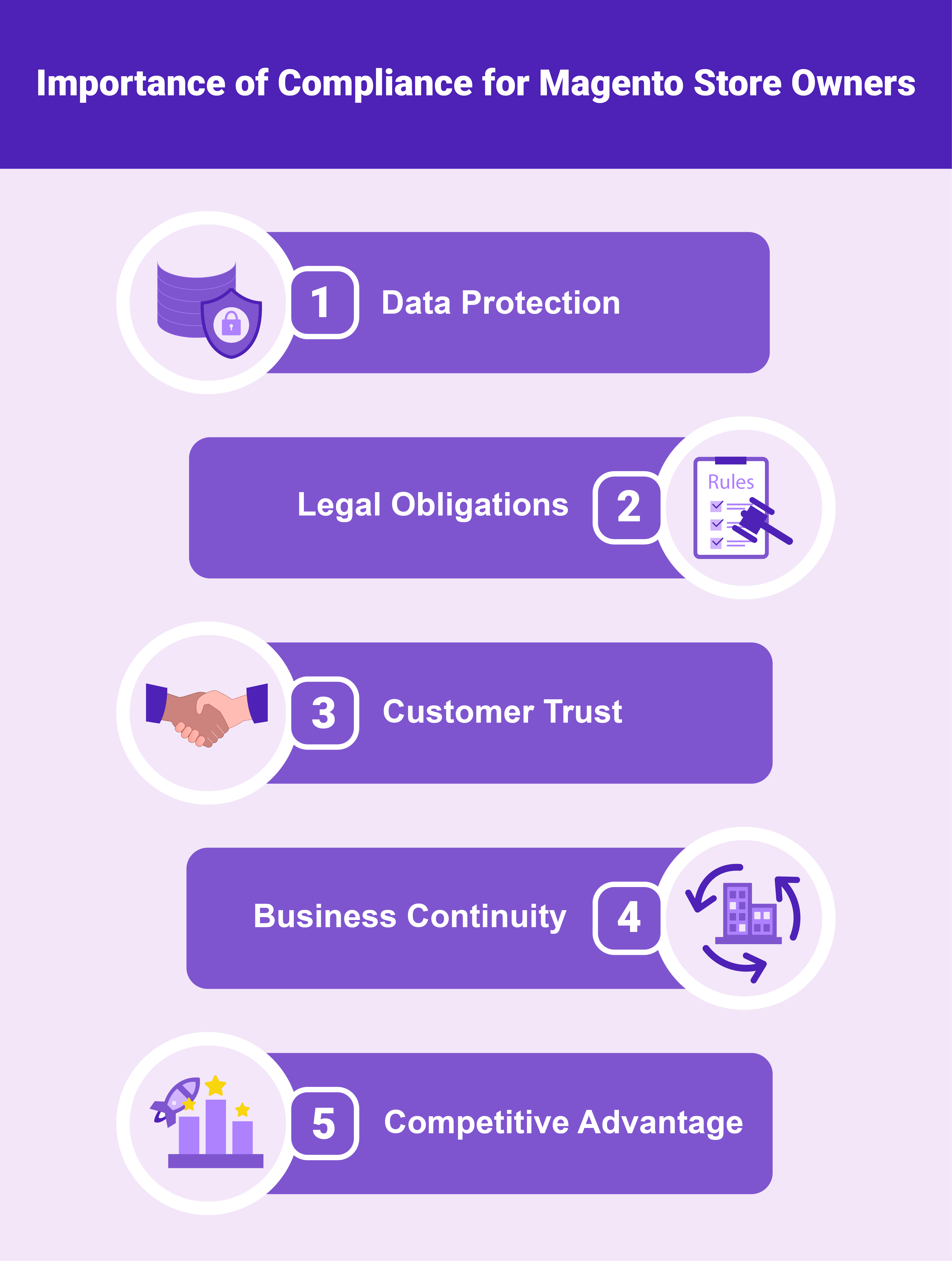
AWS Cloud Security and Compliance For Magento Store
Are you looking to enhance the security of your Magento e-commerce platform? AWS Cloud Security ensures resilient protection and compliance. It helps in protecting sensitive data. It also mitigates potential risks. This article covers implementing best practices for AWS Cloud Security Compliance. They include secure networking configuration.
Key Takeaways
-
Learn essential best practices for securing your Magento store on AWS Cloud.
-
Discover how to configure secure networking settings for your Magento hosting.
-
Explore techniques for managing identity and access securely.
-
Learn about encryption methods to protect sensitive data.
-
Understand the importance of incident response planning for security incidents.
Understanding AWS Cloud Security for Magento Store

AWS Cloud Security for Magento Store safeguards data, apps, and infrastructure.
AWS Cloud Security operates within the Amazon Web Services (AWS) cloud environment. The security framework includes various tools and services provided by AWS. It is to ensure the protection of sensitive information. It aims to mitigate potential security risks. It acts as a shield for Magento-based online stores. It guards against online threats and vulnerabilities. Features include:
-
Secure networking configuration
-
Identity and access management (IAM)
-
Data encryption
-
Security monitoring
-
Incident response planning
Magento store owners need this security to maintain data confidentiality, integrity, and availability. AWS Cloud Security for Magento Store ensures a secure shopping experience for customers. It enhances trustworthiness in the online shopping environment.
Key Features of AWS Cloud Security

| Security Aspect | Key Practices |
|---|---|
| Secure Networking Configuration | 1. Establish a Virtual Private Cloud (VPC) with appropriate network configurations. 2. Segregate resources using subnets and apply network access control lists (ACLs). 3. Use AWS Direct Connect and AWS Transit Gateway for heightened security. |
| Identity and Access Management | 1. Implement granular IAM policies to manage user access securely. 2. Define roles, groups, and permissions based on the principle of least privilege. 3. IAM policies are regularly updated to meet security and compliance goals. |
| Data Encryption | 1. Encrypt data in transit and at rest using AWS Key Management Service (KMS) for secure key management. 2. Integrate encryption into AWS services like Amazon S3 SSE for better security. 3. Implement SSL/TLS to encrypt data in transit. |
| Security Monitoring | 1. Use AWS security monitoring and logging for real-time threat detection and response. 2. Use AWS CloudTrail to log API activity and Amazon GuardDuty to detect threats. |
| Incident Response Planning | 1. Develop incident response procedures in case of security incidents. 2. Define clear escalation paths, communication channels, and decision-making processes. 3. Conduct regular training sessions and tabletop exercises for incident response team members. |
Compliance Standards for Magento Websites

Compliance standards are guidelines and regulations that organizations must adhere to. They ensure the security and privacy of data. Common compliance standards include PCI DSS and GDPR. These standards are important for maintaining AWS cloud integrity.
1. PCI DSS (Payment Card Industry Data Security Standard)
PCI DSS is a set of security standards. It ensures secure environments for companies handling credit card information. Organizations must follow PCI DSS requirements to protect cardholder data, including:
-
Encryption
-
Access control
-
Regular testing of security systems
Compliance with PCI DSS is important. It's necessary for e-commerce businesses. They process credit card payments. It helps prevent data breaches and financial losses.
2. GDPR (General Data Protection Regulation)
GDPR is a comprehensive data protection law. It regulates the processing of individuals' data within the European Union (EU). It also covers the European Economic Area (EEA). It imposes strict requirements on organizations about:
-
Consent
-
Transparency
-
Individual rights
Compliance with GDPR involves implementing measures. These measures ensure the lawful and secure processing of personal data. They include access controls and data breach notification procedures.
3. HIPAA (Health Insurance Portability and Accountability Act)
HIPAA is a US law setting standards for protecting sensitive patient health information. Covered entities include healthcare providers and health insurance companies. They must follow HIPAA regulations to safeguard PHI. Compliance ensures:
-
Confidentiality
-
Integrity
-
Availability
Compliance involves implementing administrative, physical, and technical safeguards to protect PHI.
4. SOC 2 (Service Organization Control 2)
SOC 2 is a framework by the American Institute of CPAs (AICPA) evaluating the
-
Security
-
Availability
-
Processing integrity
-
Confidentiality
-
Privacy of service providers
Cloud service providers handling customer data must undergo SOC 2 audits. These audits are necessary to prove compliance with security and privacy requirements. Compliance implements controls and procedures to ensure the security and integrity of customer data. These measures include access controls, monitoring, and incident response.
5. ISO 27001 (International Organization for Standardization)
ISO 27001 is a globally recognized standard for information security management systems (ISMS). Organizations get ISO 27001 certification by managing sensitive company information. It includes managing people, processes, and IT systems effectively. Compliance involves conducting risk assessments. It also involves implementing security controls. Organizations must continuously track and improve the ISMS's effectiveness.
Importance of Compliance for Magento Store Owners

1. Data Protection
-
Compliance standards such as PCI DSS mandate specific requirements.
-
Adhering to these standards helps protect payment data securely.
-
It safeguards customer data from **unauthorized access*8 and breaches.
2. Legal Obligations
-
Compliance with regulations such as GDPR is essential to avoid legal repercussions.
-
Non-compliance can result in hefty fines and damage to the reputation of the business.
-
Compliance demonstrates a commitment to protecting customer privacy and upholding legal obligations.
3. Customer Trust
-
Maintaining compliance instills trust among customers.
-
It ensures their personal and financial data is handled securely.
-
Compliance helps enhance the reputation of the Magento store.
-
It leads to increased customer loyalty and trust.
4. Business Continuity
-
Compliance with industry standards ensures the continuity of business operations.
-
Implementing security measures helps cut the risk of disruptions. It helps avoid security incidents or regulatory penalties.
-
Magento store owners can operate smoothly and be free from legal or operational challenges.
5. Competitive Advantage
-
Demonstrating compliance with industry standards gives Magento store owners a competitive edge.
-
Compliance enhances the credibility and trustworthiness of the business. It attracts customers who focus on security and privacy.
-
It distinguishes the Magento store from competitors. It can lead to increased sales and growth opportunities.
FAQs
1. What are the key security best practices for AWS cloud compliance for a Magento store?
The top practices for Magento store AWS cloud compliance involve important steps. These include ensuring proper configuration of AWS infrastructure and regular security assessments. It also includes implementing encryption for data at rest and in transit.
2. How does AWS infrastructure play a role in the security posture of a Magento store?
AWS infrastructure offers a secure environment for hosting a Magento store. It offers security services like identity management and data encryption. Leveraging AWS infrastructure can enhance the security posture of the Magento store.
3. What's the shared responsibility model for AWS and Magento store owner security?
The shared responsibility model states that AWS secures the Magento cloud infrastructure. The Magento store owner secures data, applications, and configurations within AWS. Collaboration between AWS and the customer is necessary for strong security.
4. What security tools does AWS provide to help enhance the security of a Magento store?
AWS provides a range of security tools and services. These include Amazon GuardDuty for threat detection. AWS Config monitors resource configurations. AWS Identity and Access Management (IAM) manages access to AWS services. AWS Key Management Service (KMS) handles encryption key management. These tools enhance the security of a Magento store.
5. How can a Magento store owner ensure secure AWS usage for their business?
To ensure secure AWS usage for a Magento store, the owner should:
Regularly review and follow AWS security documentation. Implement best security practices. Use AWS security solutions and services. Educate security teams through AWS training resources. Leverage AWS Marketplace for more security tools.
6. How can a Magento store owner create and manage AWS accounts securely?
To manage AWS accounts, a Magento store owner should follow AWS best practices for setup. Enable Multi-Factor Authentication (MFA) for account access. Set up strong password policies. Regularly track account activity. Restrict access to sensitive AWS services to trusted individuals.
Summary
AWS Cloud Security compliance provides a strong framework. It safeguards your data, applications, and infrastructure. It occurs within the AWS cloud environment. Here's a quick recap of what we discussed:
-
Provides insights into AWS Cloud Security and its significance for Magento store owners.
-
It discusses common compliance standards like PCI DSS, GDPR, HIPAA, SOC 2, and ISO 27001.
-
Importance of compliance in protecting data, meeting legal obligations and building customer trust.
Explore the advantages of Magento hosting server for improved security and performance for your AWS setup.



